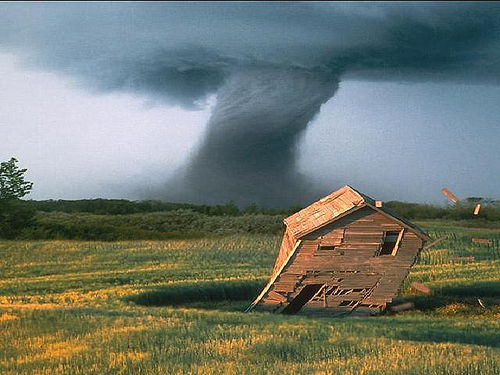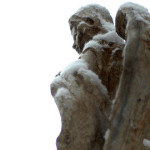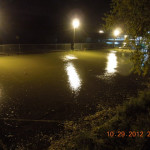We run our website the way we wished the whole internet worked: we provide high quality original content with no ads. We are funded solely by your direct support. Please consider supporting this project.

“Natural” Evil? 7 Arguments Implicating Satan
Image by Jmos® via Flickr
We believe that God is the Creator of nature, but nature simply does not seem to point to a God of love. Parasites, viruses, bacteria, diseases and cancer kill millions and torment millions more, humans and animals alike. Earthquakes, hurricanes, tsunamis, mudslides and volcanoes do the same.
Theists have traditionally argued that God has a greater purpose for allowing “natural” evil to exist in creation. They argue that through “natural” evils, God is teaching us, punishing us, refining us, or something of the sort. Other less traditional theists have argued that these things are inevitable side effects of other positive things in creation, such as allowing for creation to exemplify its own creativity and spontaneity.
Both views fall short because they fail to acknowledge the role that Satan and fallen Powers play in creation. We cannot adequately explain “natural” evil unless we accept that Satan and other rebellious cosmic forces have had a corrupting influence on creation.
In what follows I offer seven brief arguments supporting this position.
1. The Argument From Animal Suffering
If God is the Creator of nature, and if it’s true that nature sometimes (often!) makes animals suffer, then it seems we have to either:
- a) hold that God is responsible for animal suffering, hence is not all good;
- b) hold that God is all good, but animal suffering is necessary; or
- c) hold that free agents are responsible for animal suffering.
Option (a) obviously isn’t viable for people who believe God is all good. Option (b) is a possibility, but I’ve frankly never found a convincing argument in its defense. An all-powerful God surely could have created an animal kingdom where survival doesn’t hang on devouring other animals, for example. So, we’re left with option (c). This is the option we presuppose when we hold humans culpable for inflicting suffering on animals.
But when no human is involved, who are we to hold responsible? The only possible answer, so far as I can see, is non-human free agents.
2. The Argument From Demonically Influenced Infirmities
The Gospels frequently (but not always) attribute infirmities to demonic activity. We must remember the incredible stature and authority ascribed to Satan in the New Testament. He is called (among other things) the “lord” (archon) of the world (Jn 12:31, 14:30; 16:11), the principality and power of the air (Eph 2:2) and the god of this age (2 Cor. 4:4). He is said to control the entire world (IJn 5:19) and to own all the authority of all the kingdoms of the world (Lk 4:5-7). In this light, why should we think it impossible that this fallen archangel, along with his minions, has messed with the natural order of things?
3. The Argument from God’s Creational Battles
There are dozens of passages—other than those found in Genesis 1 and 2— that refer to God’s act of creation. And all of them involve God battling forces of evil and/or chaos (see, eg. Ps. 29:3-4; 104:3-9; 74:10-13. 89:9-10; Prov. 8: 27-29; Job 9:13; 38:6-11; Hab 3:8-15). Biblical authors are uniformly confident that Yahweh can handle these cosmic foes. Yet, his victory is considered praiseworthy precisely because these foes are real and formidable. These passages teach that God faces opposition on a cosmic level when he creates and preserves the world.
4. The Argument from God’s Non-Violent Creational Ideal
In the creation account in Genesis 1:29-30, God didn’t give animals to each other to eat. Nor did God give animals to humans to eat. This is reiterated in Genesis 2 when the Lord tells Adam he was “free to eat from any tree in the garden” (vs. 16-17). Adam was not free to eat any of the animals. It seems, then, that the food chain in God’s ideal creation was non-carnivorous and non-violent.
5. The Argument from a Cursed Nature
Genesis 3 gives us an account of the “fall” (or “rebellion”) of humans. Between verses 14 and 19 we learn that because of the fall:
- there will be hostility between snakes and people (vs. 15)
- women will experience pain in child birth (vs. 16)
- the earth will be stubborn in yielding vegetation (vss. 17 & 19)
- vegetation will now contain thorns and thistles (vs. 18)
- humans will die (vs. 19)
The world we now live in is cursed. This means that the laws of nature that have naturally brought about hostile snakes, pain in childbirth, hard-to-till soil, thorns and thistles and death are not altogether “natural.” They do not conform to God’s creational ideal. They rather reflect a nature that has been cursed.
6. The Argument from Cosmic Redemption
The New Testament teaches that Christ died not just to redeem humans; he died to restore the entire creation or “all things” as Paul states in Col. 1:19-20. He also says the whole creation is groaning to be “liberated from its bondage to decay and brought into the freedom and glory of the children of God” (Rom. 8:21). Clearly, the creation we currently live in is not the creation God originally spoke into being. It’s been corrupted.
7. An Argument from the Early Church Fathers
The primary way the early theologians explained evil in nature was by appealing to the work of Satan, powers and demons. These fathers uniformly believed that angels, like humans, were created free and given a sphere of influence and responsibility over creation. As with humans, angels could use this influence for good, as God intended, or they could choose to use it for evil.
Conclusion
We don’t need to search for good divine purposes behind “natural” evil any more than we need to search for them behind evil that humans inflict on one another. All evil, “natural” or otherwise, is ultimately due to wills other than God.
So the next time a tsunami wipes out an entire village or an earthquake massacres thousands of people; the next time you hear about the millions suffering from drought and famine, or when you consider the untold pain of millions suffering and dying from any number of other diseases, don’t say “This is the work of God.” Say rather, “An Enemy has done this” (Mt 13:28).
This post is an abbreviated version of an earlier article by Greg. If you’d like to read the more detailed post, you can find it here.
Also check out this Q & A on the topic of Spiritual Warfare.
Category: General
Tags: Creation, God at War, Natural Evil, Problem of Evil, Satan, Theodicy, Warfare Worldview
Topics: Creation Care, Spiritual Warfare, Cosmic Conflict
Related Reading

4 Reasons to Wake Up to the Warfare Worldview
Image by postbear via Flickr A view of the world that grounds the problem of evil in spiritual warfare is not one that many modern people find easy to accept. To many contemporaries, the notion is preposterous that real, semi-autonomous, self-determining, and invisible spirits exist that can and do influence our lives. The whole thing sounds…

SERMON CLIP: Hell in a Nutshell
Is hell for real? Is it what we have been told it is? Does an all-loving God really torture people there forever? These are a few of the questions that Greg Boyd touches on in this weeks sermon clip. In the full sermon, Greg explores the fallacy of relativism, the singular truth of Jesus as…

Gays and God’s Beebe Bird Massacre
So, what about those thousands of birds that died suddenly in Beebe Arkansas on New Years Eve? Some say it was caused by fireworks. Others say it more likely was due to hail or lightening. And, of course, there will always be those who chalk it up to pesty aliens. (Why don’t they just leave…

God-Talk When Disaster Strikes
Kent Annan posted 5 God Excuses to Avoid After a Natural Disaster and Conor Finnegan shared some social media God-speak that was posted in the aftermath of Sandy’s devastation. Disasters like this reveal so much about our picture of God. Let’s be careful to reflect the love of God when we speak in the midst…

Storming the Gates of Hell
Jesus said: “I will build my church, and the gates of Hades will not prevail against it.” (Mt 16:18) To understand Jesus’ teaching here, there are a few things you should know. First, “Hades” was the standard term for the underworld, which means that Jesus was probably referring to the whole of the Satanic kingdom.…

Did God Cause the Polar Vortex?
When is this polar vortex thing going to end? It’s March, and even in Minnesota we expect to see temperatures warmer than this. With all of the sleet and cold in the south, it seems like schools are closing more than they are open. While this is not a catastrophic event like a hurricane, tsunami,…
